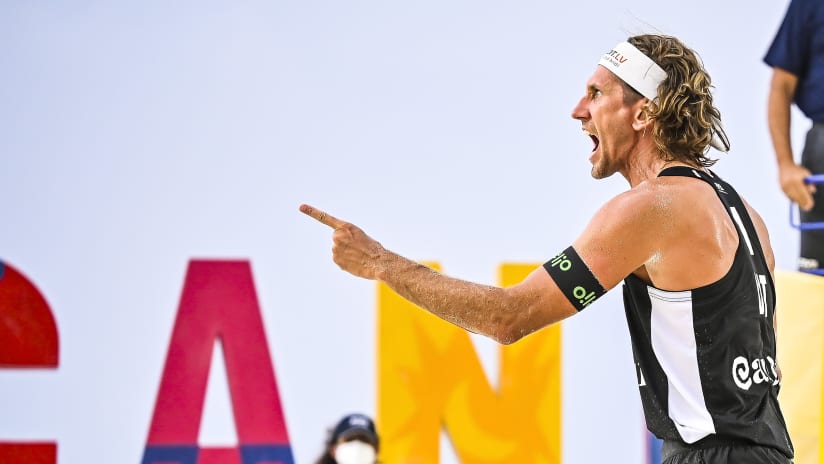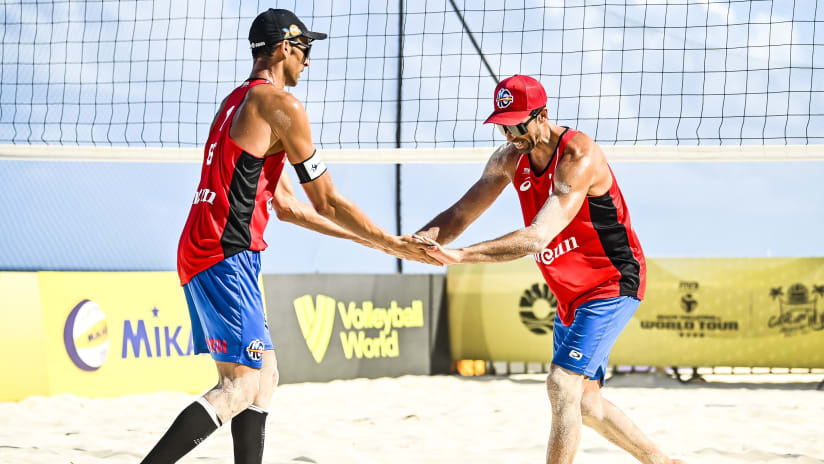Take a breath. Relax. Calm the nerves. The past three weeks have been one heck of a sprint for the sport of beach volleyball – for fans, players, coaches, referees, organizers and everyone in between. So let’s all just take a second and do a brief inventory of what the beach volleyball landscape has reshaped itself into for the final two Olympic qualifying tournaments of the year, in Sochi, Russia; and Ostrava, Czech Republic.
Tokyo Tracker: All eyes on two qualifying spots
Four teams are in the hunt heading into Sochi and Ostrava
Published 08:36, 06 May 2021

We did not run a Tokyo Tracker throughout the Cancun Bubble because the points were changing almost daily. It would have been confusing, both for us and for you, to read something one day, only for it to be wrong on the next. So we waited.
But here is a look at the men' competition. Much of the race is essentially decided with the last safe spot in the rankings likely to be Spain’s Adrian Gavira and Pablo Herrera, whose 6,560 points should have no problem holding up. Note that Paolo Nicolai and Daniele Lupo (Italy) and Martins Plavins and Edgars Tocs (Latvia) earned berths at the Olympics via the Tokyo Beach Volleyball Qualification tournament in Haiyang, China in September 2019, and Russians Oleg Stoyanovskiy and Viacheslav Krasilnikov are qualified as reigning world champions.

Herrera & Gavira (ESP)
From there, however, things get quite messy, in the best of ways. The final three spots in the Olympic rankings belong to Chile’s Esteban and Marco Grimalt (6,140 points), Italy’s Adrian Carambula and Enrico Rossi (6,120 points), and Latvia’s Aleksandrs Samoilovs and Janis Smedins (6,040 points). The fact that it is those three teams in the hunt for the Olympic spots is wild enough. Prior to Cancun, Rossi and Carambula would have been considered underdogs to make the Tokyo Olympics – and then they rattled off two fourths and a fifth in the Bubble, leaping not only Swiss Adrian Heidrich and Mirco Gerson, but Samoilovs and Smedins as well.
In contention, then, for those final few spots are: Poland’s Piotr Kantor and Bartosz Losiak (5,940 points), Heidrich and Gerson (5,800 points), Canada’s Sam Pedlow and Sam Schachter (5,700 points), and Germany’s Lars Fluggen and Nils Ehlers (5,700 points). Russia’s Taras Myskiv and Nikita Liamin (5,580) and the Netherlands’ Christiaan Varenhorst and Steven van de Velde (5,540) are long shots – but so were Carambula and Rossi. They're not totally out of it, but it will require one heck of an effort in the final two events to qualify.
At this point in the race, virtually all of the teams in contention require a semifinal finish or above. It goes without saying that medals are best. Here is what each team needs to pass Samoilovs and Smedins, provided that 6,040 points is the total needed to qualify:
Piotr Kantor, Bartosz Losiak: The worst finish of Kantor and Losiak's 12 being used for their Olympic points are 400-point finishes in Tokyo, Doha, and Xiamen. So, with two events remaining, they can only gain points if they take fifth or better. A fifth would bump them up 80 points, leaving them 20 shy of Samoilovs and Smedins. Another fifth in Ostrava would push them over the hump. A fourth, however, would provide them a 160-point boost, putting them within 20 of then leaping Carambula and Rossi as well. A pair of fifths or better in both events should be enough to put the Polish into their second consecutive Olympic Games.
Mirco Gerson, Adrian Heidrich: The next two finishes the Swiss are able to drop are both 320-point finishes, in Espinho and Warsaw. This puts them in an excellent position to pick up points quicker than the Polish, since they could gain ground even with a ninth in Sochi and Ostrava. They are 240-points back from the Latvians, which means that a fourth would tie them with Samoilovs and Smedins, and anything better would push them into the final spot. The Swiss need either one huge finish or a pair of fifths or better to have a chance.
Sam Pedlow, Sam Schachter: The Canadian Sams are, as Pedlow described them, the Kings of Ninth. The bottom six finishes on their Olympic ledger are ninth-place finishes. This means that they can only improve with finishes better than ninth. They will need, at the very least, one huge finish in Sochi or Ostrava to help them jump into contention. A medal of any colour would be a significant help, but they’ll likely need two medals in the final two events to punch their ticket to Tokyo.
Lars Fluggen, Nils Ehlers: Aside from Kantor and Losiak, of the teams outside of the current rankings, Fluggen and Ehlers may have the next best shot at climbing the ladder the quickest. Their finishes are remarkably top-heavy, leaving the next two events to drop being a 300-point ninth at the Edmonton three-star and a 320-point seventeenth at the Moscow four-star. Fluggen and Ehlers have proven they can bust out a big finish, with a silver at the Tokyo four-star and a fifth at the Vienna Major. A victory in Sochi would pad 500 points to their total, still leaving a 320-point finish ready to drop in Ostrava. If they even break pool, they’re adding points to their total. They have a long road to go, but they have the fastest means of getting to the finish line.







